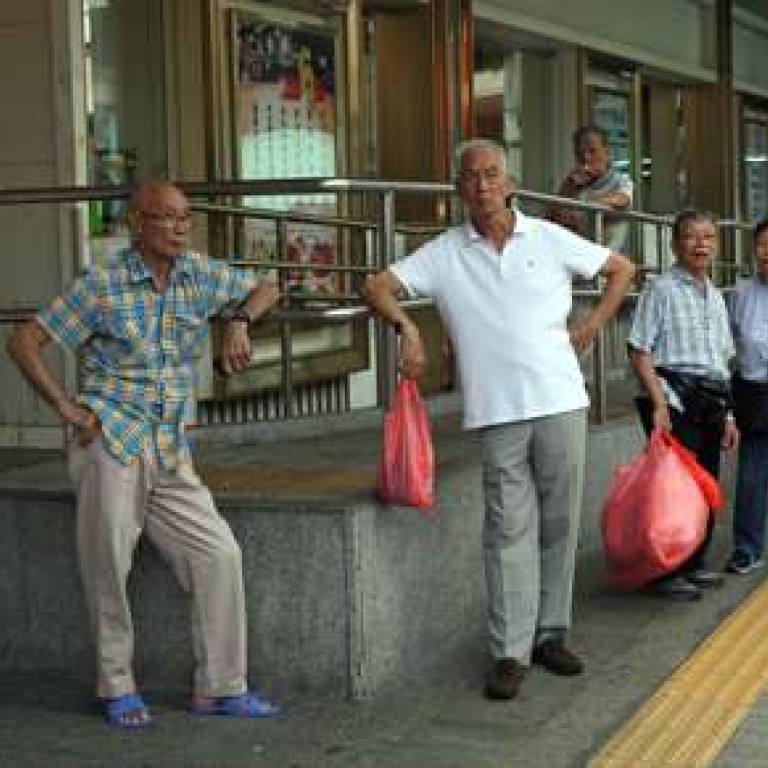
Hong Kong retirement protection debate prompts protests and criticism
Government is expected to announce way forward later this year or in early 2017, and it’s tipped to opt for a means-tested scheme
The public debate on retirement protection for the city’s elderly population reached a climax this week, with scores of Hongkongers taking to the streets last Sunday in a last-ditch attempt to voice their opinions before the end of a public consultation exercise on two contested proposals.
More than 1,000 people, including about 300 elderly or disabled wheelchair users, made their way from Central to Admiralty to pressure the government to back a universal pension scheme rather than a non-universal plan that will cover only poorer elderly citizens.
The issue has been around since at least the 1980s, when support for a universal pension plan was gaining traction. The government finally introduced the Mandatory Provident Fund system in 2000, although advocates of a full pension scheme were far from satisfied.
Retirement protection came up again early in the current term of Chief Executive Leung Chun-ying, resulting in the six-month consultation exercise which ended on Tuesday.
However, the consultation is controversial. One reason is that the government favours the non-universal approach which, if implemented, would come as a blow to many of the city’s one million elderly people.

Another is that the government declined to include several popular proposals put forward by scholars and non-governmental organisations last year – a move that critics cite as an example of the government’s refusal to listen and engage with the public.
The issue of retirement protection is crucial for Hong Kong which, like many developed countries, is tackling problems arising from a rapidly ageing population and shrinking workforce. There were about 1.07 million Hongkongers aged 65 or over in 2014, and the number is expected to more than double to 2.58 million by 2064. This means that elderly people will account for about one-third of the city’s population.
The universal scheme would allow everyone aged 65 or above to receive a pension of HK$3,230 per month, while the non-universal scheme would provide the same amount but only for eligible residents.
Those who could qualify include elderly people living on their own with a monthly income below HK$7,340 and assets amounting to less than HK$80,000. Married couples with a monthly income below HK$11,830 and assets worth less than HK$125,000 would also be eligible.
The government suggested various ways to pay for the two proposals, such as increasing salaries and profits tax and introducing a goods and services tax, also known as a sales tax. The business sector has argued that such measures will impose extra burdens on employers, particularly small and medium-sized firms.
The city’s existing protections have long been criticised as inadequate, with the government itself admitting that they fail to offer sufficient coverage.
At present, the city gives all elderly over the age of 70 a monthly handout of HK$1,290. Other measures are means-tested. They are a HK$2,495 allowance to those above 65 with assets below HK$219,000 and the Comprehensive Social Security Allowance, which has even more stringent income and asset limits.
Under the Mandatory Provident Fund, employers and employees are required to contribute equal amounts up to HK$1,500 each, which accumulate in a fund for an employee’s retirement.
Critics say this system fails to provide adequate coverage and contains many drawbacks – including a legal loophole where employers can settle severance and long-service payments using contributions made to the fund. In 2014, 43,500 employees lost HK$3 billion as a result of this technicality.
The government is expected to release a report produced by an independent adviser on the results of the consultation and recommendations for the way forward by the end of this year or early 2017.
Sources close to the government say that a more flexible non-universal scheme involving a monthly allowance of HK$3,230 for elderly people with an individual asset limit of between HK$80,000 and
HK$140,000 is the more likely outcome.
Here is a breakdown of the two proposed schemes:
UNIVERSAL SCHEME
Who qualifies: All elderly people aged 65 or above
Payment: HK$3,230 per month
Cost: HK$22.6 billion in 2015 rising to HK$56.3 billion in 2064, leading to an overall rise in expenditure of HK$2,395 billion in 50 years
How much would taxpayers pay:
● Employers and employees would be taxed 1.6 to 3.9 per cent
● Salaries tax would increase by 8.3 per cent
● Profits tax would increase by 4.2 per cent
● A goods and services tax of 4.5 per cent would be introduced
NON-UNIVERSAL SCHEME
Who qualifies: Elderly people who live on their own, with assets of no more than HK$80,000 and a monthly income below HK$7,340. Married elderly couples with assets totalling less than HK$125,000 and a monthly income of no more than HK$11,830
Payment: HK$3,230 per month
Cost: HK$2.5 billion in 2015 rising to HK$6 billion in 2064, leading to an overall increase in expenditure of HK$255.5 billion in 50 years
How could taxpayers pay:
● Employers and employees would be taxed 0.2 to 0.4 per cent
● Salaries tax would increase by 0.9 per cent
● Profits tax would increase by 0.4 per cent
● A goods and services tax of 0.5 per cent would be introduced

